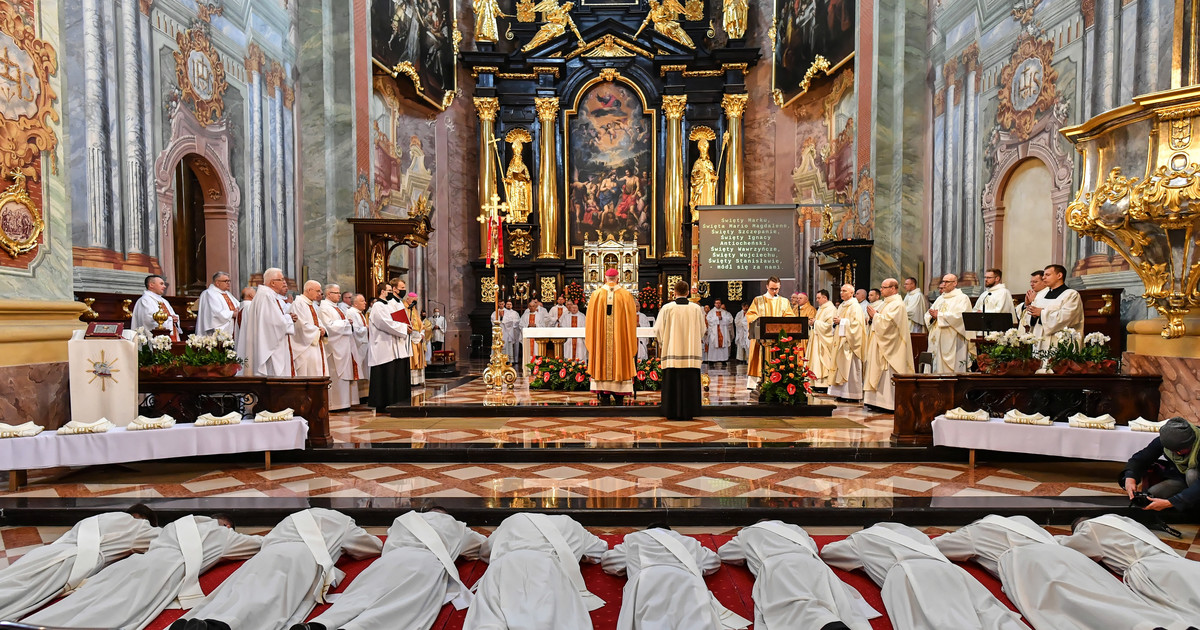- The recruitment of candidates has been completed in many seminars all over Poland. Priesthood candidates are declining, but not everyone who applies is accepted
- After two rounds of examinations and preparatory interviews, 16 of the 24 candidates were admitted to the Tarnów Seminary, said Father Ryszard Nowak, Secretary and Press Spokesman for the Bishop of Tarnów
- From October this year. in many seminaries the formation will take seven years instead of the six years used to date. The extra year is a first verification of whether a particular candidate is suitable for the seminar
- Definitely most candidates apply after graduation. After graduation, the elderly are the domain of quite large cities, where academic presbyteries are active and where various religious congregations are present – explains Onet Father Piotr Kot, chairman of the board of the Conference of Rectors of Major Seminars.
- More such information can be found on the main page of Onet.pl
The recruitment of candidates took place in many seminars all over Poland. Some are still recruiting, so we’ll have to wait for the final data, but we’re already seeing the number of candidates for the priesthood dwindle. This trend has been going on for years. Although there are dioceses that have registered more candidates this year than in previous years.
This is the case, for example, in the diocese of Koszalin-Kołobrzeg. – We were one of the first dioceses in Poland to introduce the propaedeutic year. The three generations of our priests who have graduated from seminary have already completed their seven-year formation. This year, as we can boast, we already have seven candidates – Father Piotr Skiba, the pastor of the vocations in the Diocese of Koszalin-Kołobrzeg and the priest of the major seminary in Koszalin, said in an interview with Onet, in an interview.
– For the terms of our diocese, it is a very good number. Maybe someone else will come, because the recruitment is still ongoing. In recent years, an average of five people started the propaedeutic phase, the pastor adds.
It is similar in the Archdiocese of Gdansk. – We notice a significant increase in vocations. Among other things, it is a result of prayers in parishes for vocations to the priesthood and the systematic work of priests with young people as part of the school catechesis, various pastoral groups, including the liturgical service of the altar – Father Marek Kwiecień, spokesman for the Archdiocese of Gdańsk , explains to Onet .
– Recruitment for Gdańsk Seminary is underway. Twelve candidates have applied so far. Most of them are high school graduates, some of them have academic and professional experience, he adds.
Less Willing to Priesthood
The examples of the Diocese of Koszalin-Kołobrzeg and the Archdiocese of Gdansk are exceptions to the rule. In most dioceses there has been a declining trend for years. This can be seen in the example of the Diocese of Tarnów, which is considered one of the most pious in the country.
– After two rounds of examinations and preparatory interviews, 16 of the 24 candidates were admitted to the seminar in Tarnów – said Father Ryszard Nowak, secretary and press spokesman for the Bishop of Tarnów. Not so few candidates have attended the largest seminar in Poland.
We ask if for this reason the Curia is active or planning to take any action to become a member of the seminary. – There are no so-called campaigns that encourage people to go to seminary, while various retreats are held to help discern one’s vocation – explains the priest.
The rest of the article below the video
– Currently, just over a thousand priests work actively in the Diocese of Tarnów, and more than 200 diocesan priests from Tarnów serve missions and in various countries around the world – adds Father Nowak.
An extra year of the seminar
From this academic year, the training period will also be extended in many seminars. It will be seven years, not the six it has been so far.
– The new rules for the formation of priests in Poland are laid down in the document “The Way of Formation of Priests in Poland. Ratio institutionis sacerdotalis pro Polonia”, which will come into effect on October 1, explains Father Łukasz Michalczewski, spokesman for the Archdiocese from Krakow, from.
It concerns the introduction of the so-called introductory phase, ie the period of preparation for studying at the seminary. In many dioceses, the places where future clergy are trained have just been established or have been around for several years. Such a center functions in Kalisz (for three dioceses), Legnica and Opole (for two dioceses), among others.
– The introduction phase can even last longer than a year. It aims to shape a young person’s personal relationship with God so that at this time there is a deeper understanding of their own motivations and capabilities in the context of choosing a priestly life. This requires first getting to know yourself as a human being, based on the past life history, in all areas: personality, emotional, intellectual, psychosexual and cultural. The ability to build community with others is also important, hence the atmosphere of a home in which mutual communication is so strongly emphasized in the Ratio, explains Father Piotr Kot, Chairman of the Board of the Conference of Rectors of Major Seminars, off to Onet. .
– In the initial phase it is generally about his own identity as a believer who, living in that and not in another world, is himself formed by God in the communion of the Catholic Church, and in the future as a priest, he must lead other people living in the areopagi of the modern world to experience one’s own history in relation to the living God and in the light of his word – adds the priest.
The diocese of Koszalin-Kołobrzeg was one of the first to introduce the propaedeutic phase.
– People who start the propaedeutic phase do not live in the seminary, but in the parish in Szczecinek. It can be said that this is an initial formation and initial verification. Although people are not students, they have different classes: introduction to the catechism, psychological workshops, foreign languages, Latin. They also take classes in nursing homes. This propaedeutic year should be a leveling of the spiritual level, but also the personal and intellectual level. It is about general education, about building a relationship not only with God, but also with each other – explains Father Skiba.
Who goes to seminary?
As Father Skiba points out, the profile of the seminary candidates has changed somewhat in recent years.
– There are more and more candidates who have previously studied or worked. This year, the majority of candidates applied right after graduating from high school. However, there is no rule here. In recent years, certainly more people have come forward who have worked or graduated before entering seminary. These are such vocations, you might say, more mature – explains the priest.
It is similar in the Diocese of Tarnów. – Candidates currently registering for the seminar are approximately 50 percent. this year high school graduates, and the other 50 percent. are people who have already completed various studies or work – says Father Nowak.
– Definitely the largest number of candidates apply after graduation. After graduation, the elderly are the domain of fairly large cities, where there are academic chaplains and where various religious congregations are present. There are candidates who are much older, but this is a small number. Young men who come to seminary usually make decisions in an internal dialogue with God, which proves that the Holy Spirit works in a person. The Holy Spirit acts freely, which is why the decisions about the choice of the priesthood sometimes surprise even relatives and friends – concludes Father Kot.
Do you want to talk to the author? Write: [email protected]
We’re glad you’re with us. Subscribe to the Onet newsletter to receive the most valuable content from us.

“Total travelaholic. Subtly charming zombie geek. Friend of animals everywhere. Music buff. Explorer. Tv junkie.”






